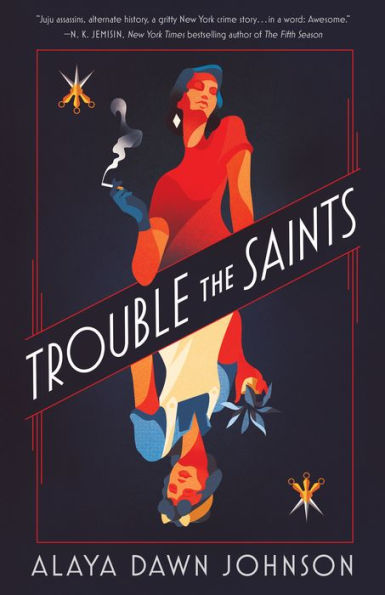My Blackness has always felt a bit like playing catch-up. Growing up in sheltered suburban spaces and a mostly white private school, I was aware of being “non-white” long before I understood Blackness. All of the “non-white” kids existed in an uneasy collective. Some of us were friends; many lashed out at each other, resentful that we were lumped together—resentful that “non-white” defined us by what we were not.
My immigrant parents encouraged me to assimilate, but assimilation wasn’t enough. Twelve years of flat ironing my hair went to internalizing white beauty standards. A decade of dedication to the white literary canon went to internalizing a white literary voice. Achieving what they called excellence could help me prove I wasn’t just their “Other.” I wanted self-empowerment within assimilation.
Trouble the Saints by Alaya Dawn Johnson takes an eerie and suspenseful noir approach to a long line of Black literature about passing and assimilation, most notably from 1920s novelist Nella Larsen up to recent releases like Brit Bennett’s The Vanishing Half.
To be clear, passing isn’t the same as assimilation, although Trouble the Saints explores both; being able to pass as a mixed-race or light-skinned person often begins with a focus on skin tone as “evidence” of race. But Johnson illustrates that strategies I had used to assimilate and those used to pass work within the same truth: race is constructed, and whiteness is nothing if not a performance to which “non-whites” are meant to aspire. Although passing destabilizes race, it ultimately works to center and affirm whiteness.
In Trouble the Saints, Phyllis has grown up in 1930s New York knowing she has “saints’ hands”: juju hands manifested by a few Black and brown people in a generation, seemingly at random. Throughout the story, saints’ hands are compared to “the numbers,” a real underground lottery system started by Black people to promote Black wealth. The hands are seemingly meant to empower the oppressed—“a little luck the Lord gives us to let us get on top, just for a bit, even though they got all the power”. Through touch, Phyllis’ mixed-race British Hindu lover, Dev, can sense threats to others or himself, and we later meet Alvin, a Black teenager who can learn a person’s darkest secrets.
Buy the Book


Trouble the Saints
Phyllis has used her power, deadly accuracy, to become a knife-wielding assassin for a white Russian mobster, Victor. She chose to distance herself from her loved ones, believing in Victor’s promise to only commission her to execute people who “deserve” it. Victor has convinced her that if her hands itch for justice, he is the only one who can provide it.
Except Victor’s definition of justice is a lie—one that actually targeted her for death from the beginning, and then exploited her to kill those whose power he wanted for himself.
By tying Phyllis’ passing to her life as an assassin, Johnson reveals that passing is not just about passive self-protection; it’s about access to power and complicity in violence under white supremacy. Phyllis convinces herself that she chose to pass and work for Victor in order to use her power to right an unjust world. But when used to enable Victor’s slaughter of gifted people of color, her saints’ hands eventually turn against her. Her efforts have only managed to uphold white supremacy.
“All that power they got, and here we are just wanting a nibble. And for that nibble they take our souls” .
Performing whiteness also requires perpetuating the marginalization of others’ “non-whiteness.” Phyllis calls Walter, a Native American who also works for Victor, by the mob’s racial slur, “because calling him [that slur] with white folks helped them dismiss my thick lips and stiff hair”. Doing so only alienates her from an ally and potential friend. Dev, too, is acutely aware that “either one of us alone seems to occupy that liminal space between ‘acceptable’ and ‘colored,’ but together we are unequivocally Not White”. Still, his solidarity is just as slippery—understanding the burden of his own complicity in the mob, but later believing Alvin to be a threat before violence ever comes to pass.
Even Tamara demonstrates the futility of running to white violence for protection from white violence. She adopts an “air of dangerous exoticism” to regularly dance and read tarot cards at Victor’s club. She can’t pass, but she can assimilate, intentionally making her non-whiteness hyper-visible. She believes she’s less complicit in Victor’s violence than Phyllis and Walter, who murdered for him.
But we learn that by walking away when her friends are targeted, content with the illusion of control Victor gave her over the jazz club, Tamara also chose the violence inherent in white power. She had come up North after witnessing her friend get lynched to look for “the whitest white man”: “With him, nothing could happen to me like what happened to Pete”. But she must betray her love for Dev and Phyllis and undermine her own conjure as an oracle to keep the power she gained by proxy.
That illusion of choice, that empowerment can be found within the shadow of white supremacy, is a lose-lose game. Johnson is clear: no one truly wins playing the numbers in a system that will steal the winnings. “Non-whiteness,” as Johnson depicts it and as I learned growing up, is not enough to sustain solidarity because it only exists in opposition to whiteness. Even the tools of our empowerment, like the saints’ hands, can be weaponized against us.
And yet the saints’ hands, meant to enact unflinching justice, leave little room for grace. “The hands are obsessed with our necessary complicity,” Dev writes to Phyllis. “They would rather kill us for the greater good than let us find happiness in this lifetime”. Like Coco in Netflix’s Dear White People, Tamara admits that “she tried to do good, she tried. But [she] also wanted fine liquor and fur coats and long nights of jazz … and why should she have to choose between them?”. Despite their many sins—against each other, against others they should have protected—Phyllis, Dev, Tamara, and Walter find a kind of happiness as a community of failed, complicit people, who still find ways to love and be loved.
So how do we accept the paradox that is our “necessary complicity,” the compromises of living under white supremacy? Johnson’s ultimately tragic ending is still not without hope. Complicity seeks to separate and silence, so we must transform silence into language and action. If “non-whiteness” is meant to define us by what we are not, embracing our communities and redefining solidarity beyond essentialism is a power we can only find in each other.
For me, I had to realize it was internalized anti-Blackness that made me aspire to white definitions of beauty, safety, achievement, power. Striving to become white enough to not be “non-white” only alienated me from communities where I could’ve been supported. Unlearning those feelings of inadequacy and claiming my Blackness has finally allowed me to embrace self-love.
Trouble the Saints is available from Tor Books.
Read an excerpt here.
Bezi Yohannes is a bookstagrammer and book reviewer centering speculative fiction by and about Black women at @beingabookwyrm. She recently graduated from Georgetown University, where she finished her master’s degree in English Literature. Merging her love for epic fantasy and her passion for critical race and Black feminist studies, she wrote her thesis on visibility versus representation in the “colorblind” casting of Black female leads in fantasy media. She currently interns for the Laura Dail Literary Agency.










